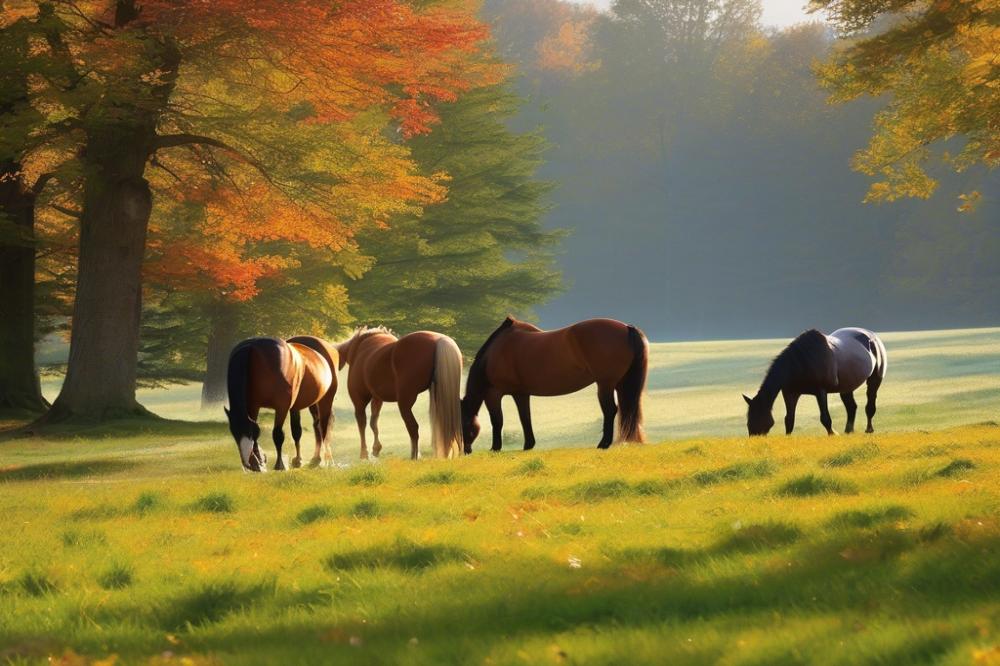Importance of seasonal horse care
Caring for horses requires attention all year long. Each season presents its own set of challenges and opportunities. Understanding how weather changes and environmental factors impact equine health routines is crucial. Horses must adapt, and so must their caretakers.
In winter, blankets and proper nutrition become essential. Cold temperatures can lead to colds and other issues. Spring brings new growth in pastures and the potential for allergies. High pollen counts affect equine health, and this shouldn’t be taken lightly. During summer, heat stress can become a serious concern. Hydration, shade, and insect control are vital during the hotter months. Autumn introduces shedding and preparation for the colder weather ahead. Proper grooming and health checks help reduce problems in the coming months.
This article will cover diverse topics related to seasonal horse care. We will explore dietary adjustments, exercise needs, and grooming routines suited for each season. Additionally, advice on managing specific health concerns will be provided. Readers will find helpful strategies to ensure their horses stay healthy and happy throughout the year.
Seasonal Horse Care

Changes in weather can greatly affect the well-being of horses. Each season brings its own challenges and benefits. Understanding these shifts is essential for owners dedicated to their horses’ health. As temperatures rise or fall, various factors come into play. Grooming routines might need to shift alongside the changing climate. For instance, longer daylight hours in spring can lead to increased shedding.
Summer heat intensifies concerns like dehydration and sunburn. Horses require ample shade and access to fresh water. Regular checks are necessary to make sure they stay hydrated. Nighttime can provide some relief, as temperatures cool down. However, this is also the time for pesky insects, which can lead to irritability. Keeping fly masks and repellents handy is a good practice.
As autumn approaches, horses may begin their transition into a thicker winter coat. Nutrition becomes vital during this time. Owners should monitor their horse’s weight closely. A good balance of hay and grain can support the necessary changes. Furthermore, some may require different types of supplements to maintain energy levels. Management of hoof care is crucial; wet, muddy conditions can cause issues like thrush.
Winter brings its own set of difficulties. Cold temperatures can stress horses, especially those with little shelter. Blankets are often required to keep them warm. They also need more hay during these months. Increased fiber intake helps maintain body heat. Checking water supplies is important, as freezing can occur. Consider using heated buckets or water heaters to avoid this issue.
Spring marks a time of renewal. Pastures come back to life, and the need for vaccinations may arise. Owners should plan for deworming and dental check-ups. This season also leads to an uptick in allergies, so observe any signs of discomfort. Regular exercise is crucial when the weather starts to warm up again. Horses will feel more energetic after a long winter indoors.
winter care

When cold weather sets in, providing proper insulation and shelter becomes crucial for horses. They need a warm place to rest, free from harsh winds and wetness. Sturdy barns or run-in sheds are great choices. Blanketing can also help maintain body heat, especially for horses with thin coats.
Nutrition is another key factor during winter. Horses require more energy to maintain their core temperature. Feeding higher-quality hay or even grain can meet these increased energy needs. Always monitor their body condition to adjust feed amounts as necessary. Keep an eye on their weight; it can change quickly in colder months.
Hydration may seem less of a problem in winter, but it is vital to prevent dehydration. Horses often drink less when temperatures drop. Provide fresh, unfrozen water multiple times a day to keep them hydrated. Consider offering warm water; it can encourage them to drink more.
Hoof care should not be overlooked. Ice can build up in the hooves, causing discomfort and even injury. Regularly check for any stones or iceballs. Keeping hooves trimmed and clean will help fight against the cold and ice effects.
Finally, maintaining a consistent exercise routine helps keep horses fit. Cold weather doesn’t mean they can’t move. Encourage daily turnout, as long as it is safe. If ground conditions are poor, consider riding indoors or using a lunging routine to keep them active.
Spring Transition
As spring arrives, horses begin to shed their winter coats. This transition can lead to clumps of hair everywhere. Regular grooming becomes essential. Schedule extra brushing sessions to help manage shedding. A curry comb works wonders in removing loose hair. Don’t forget to check for skin irritations or bugs that may emerge with warmer weather.
Warmer temperatures signal a rise in parasite activity. These unwelcome pests can pose serious health risks to your horse. Administering a fecal egg count test is a smart move. It helps determine the need for dewormers. Make a plan for regular parasite control throughout the season. Focus on maintaining a clean living area to minimize exposure.
With the return of fresh pasture, nutrition needs undergo important changes. Gradually introduce your horse to lush grass after months of hay. Starting with short periods of grazing is key to avoiding digestive problems. Pay attention to signs of laminitis, which can arise due to sudden diet changes. Consulting with a veterinarian or nutritionist can guide your approach to feed during this transition.
Summer Grooming
Grooming a horse during the summer requires special attention. Hot weather can cause a horse to sweat more, so keeping them clean is essential. Start with brushing the coat to remove dirt and loose hair. This helps with air circulation on the skin, which can be beneficial. Use a stiff brush followed by a softer one. This sequence helps to maintain a healthy coat.
Hydration plays a crucial role in a horse’s well-being during the summer months. Horses should have access to fresh water at all times. Consider adding electrolyte supplements to their water, especially after strenuous activity. It can also help to monitor their intake. If a horse isn’t drinking enough, try offering water flavored with electrolyte solutions to encourage consumption.
Heat stress can become a serious issue for horses, especially during peak temperature days. Watch for signs such as excessive sweating or lethargy. Providing shade is necessary to help them cool down. Consider scheduling exercise during the cooler parts of the day, like early morning or late evening. Close observation can prevent heat-related health problems.
Pest management is another important aspect of summertime care. Flies and other insects can irritate horses, causing discomfort and potential health issues. Implement fly control measures by using fly sheets and repellents. Regularly cleaning the stalls and surrounding areas can also help minimize insect populations. Keeping horses healthy in the summer not only improves their comfort but also enhances their performance.
Autumn Preparations
As autumn arrives, hoof care becomes a challenge for many horse owners. Changing weather conditions can lead to slippery mud and wet environments. These factors can soften hooves, making them more prone to thrush and other issues. Regular hoof inspections become crucial. A farrier can assist in trimming and shoeing to adapt to the season.
Nutritional adjustments are also important as colder months approach. During this time, horses need more calories to maintain their body temperature. Increasing forage or adding grain can support their energy needs. Supplements might also be beneficial to ensure balanced nutrition, particularly in horses with unique dietary requirements.
Dental care should not be overlooked before winter sets in. Horses may have accumulated sharp edges on their teeth, which can lead to difficulties while eating. Scheduling a dental check-up with a veterinarian is wise. Addressing issues now can prevent weight loss and other health problems later.
Considering parasite control is another vital task as temperatures drop. Many parasites thrive during milder autumn weather. A deworming schedule should be reviewed and updated if needed. By taking preventive measures, you can help your horse stay healthy through the winter months.
Stable Management Year-Round
Maintaining a clean and safe environment for horses is crucial. A tidy stable helps prevent health issues related to bacteria and waste. Regular mucking out keeps parasites and mold at bay. Safety is a top priority for both horses and handlers. Clear pathways and good organization are key components of a reliable stable.
Stable management practices must change as seasons shift. In winter, bedding becomes vital for warmth and insulation. During summer, frequent cleaning is essential to deal with flies and heat. Adjusting water supplies also matters. In warmer months, horses may need more access to fresh water.
Ventilation is another critical factor. A stable must allow fresh air without creating drafts. In winter, stables may need to be tightly shut to keep warmth in. However, it’s essential to ensure some airflow. Fans or vents can be helpful tools for managing hot weather. They help in reducing humidity and providing a cooler space.
Temperature control should be a priority year-round. Use blankets in the cold to keep horses comfortable. In contrast, keep an eye on temperatures as summer approaches. A thermometer can aid in monitoring conditions inside the stable. Regular checks help you to act quickly if things get too warm. Make changes as needed to protect your horses from the extremes of the season.
Wrapping Up Seasonal Care for Your Horse
Adjusting your horse’s health routines throughout the year is crucial for their overall well-being. Changes in weather can impact everything from nutrition to exercise. By being proactive, you can better support your horse through each season’s unique challenges.
As temperatures shift and daylight hours fluctuate, pay close attention to how your horse responds. They may need more care during the hot days of summer. Prioritize hydration and enhance your summer grooming efforts to keep their coat healthy and free of excess heat. Conversely, in the cold months, be vigilant with winter care practices to ensure your horse stays warm and protected.
Recognizing these seasonal changes is part of being a responsible owner. Year-round vigilance leads to happier, healthier horses. Regular assessments of their health and changing needs will help catch any concerns early. Always remember, every horse is different, and their requirements may vary significantly.
In closing, seasonal care is not just a task but a commitment. Your attentiveness creates a foundation for optimal health throughout the year. Stay informed, adjust routines as needed, and keep your horse thriving no matter the season.



